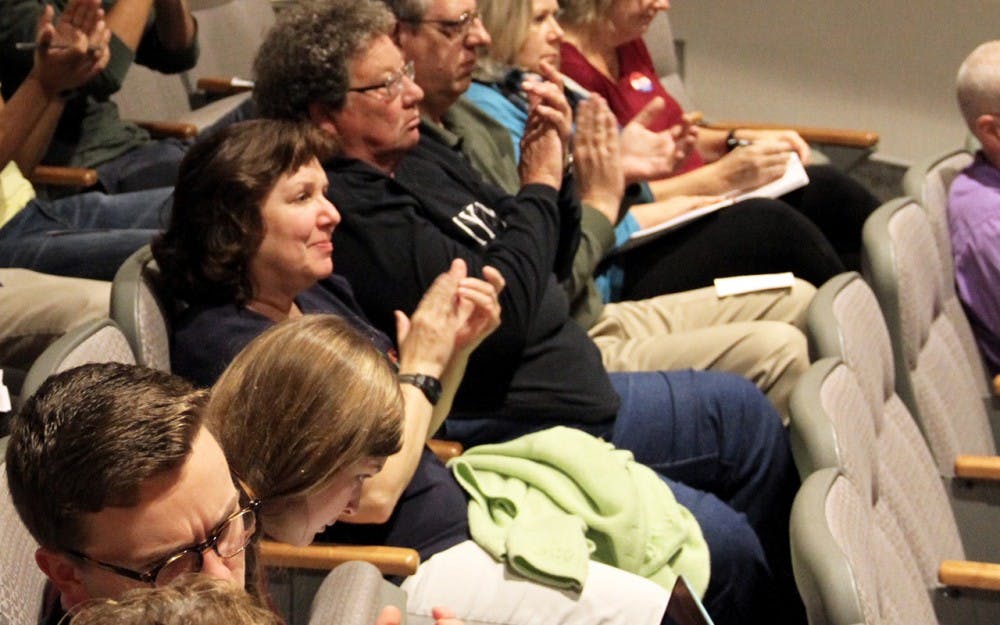A string quartet played in the background at the Monroe County Public Library to welcome people into the auditorium to talk about children just like the quartet members and how to keep those children playing in schools.
Monroe County Community School Corporation teachers and IU community members were at the Monroe County Public Library on Wednesday night to discuss the value of music education in schools.
The panel, titled “Beyond the Test Score,” focused particularly on getting students involved in music by middle school and preparing them to succeed in their lives beyond high school.
Janis Stockhouse, a band teacher at Bloomington High School North, said MCCSC has given her the opportunity to build a program of her own design to help students learn.
“Participating in any of our bands benefits students with more than just music,” Stockhouse said. “It teaches responsibility, leadership, fun, equality for all, and unlocks this passion that helps students recognize greater things in the world.”
The Indiana Coalition for Public Education put together a group of music educators for the panel, moderated by Cathy Fuentes-Rohwer, chair of the coalition, and Eric Smedley, associate director of bands at IU Jacobs School of Music.
Fuentes-Rowher said it is important to make sure community members are empowered with information and support the idea of public education and the idea that every child should have access to music curriculum.
She said the state measures success by language arts and math, but that is not the coalition’s definition of success.
“Music education is not just about learning the mechanics of music, but leadership, collaboration and all the things students need to be citizens of our society,” Fuentes-Rohwer said.
Kathy Heise, a music teacher at Fairview Elementary School, said the school has special musical aspects infused into the classroom through their artful learning curriculum. She said the teachers take the curricular standards and find a way to look at what they teach through an artist’s eye.
“How an artist looks and uses perspective, such as how an architect puts things together,” Heise said. “It’s not just used as an individual subject kids are sent to — we infuse it into all of our curriculum.”
The panel discussed the Every Student Succeeds Act. The act contains new and revised language of the Elementary and Secondary Education Act of 1965, with the new language supporting music education, according to a Department of Education press release.
The new grant program in the ESSA emphasizes access to well-rounded education in music, the arts, environmental education and computer studies.
With the passage of ESSA, states can work on the characteristics of well-rounded education in a way that ensures access to all students, including low-income families who do not have access to the arts, according to the release.
Pete Miksza, IU Jacobs School of Music professor of music education, said music participation has also been shown to increase IQ and functioning in class, which is key for kids to focus and improve their reading and listening abilities.
“Music students are likely to be on time, not skip school and have a more positive perception about school,” Miksza said.
The panel discussed the lasting impacts of music education, past the actual music learning.
He said music is a resource for students in school. He said he has seen students who go from shy and unsure of themselves their freshman year of high school to becoming drum major of the marching band their senior year.
“It’s important to recognize that students come with needs unfulfilled,” Miksza said. “We need to think about these programs that can satisfy needs before the music making can even happen, where they can find a sense of belonging.”
Jon Hansen, a music educator at Jackson Creek Middle School, said over the years he has learned there are more parts to being a music educator than just teaching the students music.
He said some of the most important conversations he has had with students have not been about music but were about being more of a soundboard for the students, someone they can trust.
“I’m an advocate and an ally to my students,” Hansen said. “I believe teachers should be an extension of their students’ families.”
Heise said it is essential for schools, including MCCSC schools, to continue to give students access to the arts and music education.
“Music cannot just be thought as being special,” Heise said. “But music being special to our children.”




